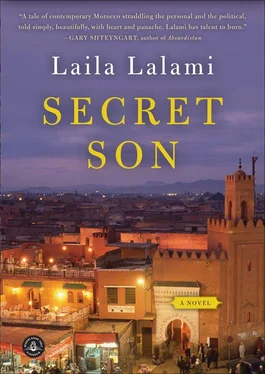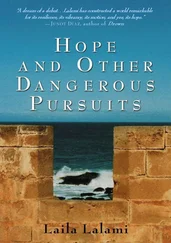• • •
RACHIDA WAS IN the bedroom when she heard the door creak. She listened for Youssef’s noises — the soft pop when he took off his shoes, the clopping of his slippered feet as he walked to the bathroom, the water running as he washed up, and finally the heavy thud when he flopped down on the divan. Amal’s visit had shaken her and she was worried she might betray herself. Still, she went into the yard and sat down on the divan next to her son. “I made a tagine of artichoke hearts.”
“I’m not very hungry.”
She said she would not eat, either, unless he ate, but that did not seem to have the intended effect on him. He just stared into space, lost in his thoughts. She watched him: the faint lines along his cheeks, the ashen complexion, the slightly trembling hands. He was in such obvious pain, and yet she felt powerless to help him. He drew his legs under him and lay back against the cushions.
In that position, he reminded her of her father, Hammou, how he would sit on the rug-covered seddari in the living room of their house in Sefrou with his pipe in hand, a bluish cloud of smoke rising above him. How she had missed her father. She was angry with him for placing her in the orphanage, even though he had told her repeatedly it was for her own good. The orphanage had been the beginning of her troubles. It had set everything in motion. She could still feel his presence sometimes, the way an amputee can feel the pain from a phantom limb. He would be sixty-five this year, if he was still alive. Had he ever looked for her after she disappeared? Did he remarry and have children? Did he still live in their old house overlooking the green fields? She caught herself — she was about to fall into one of her melancholy moods. Now was not the time for those questions about what should have been. She had to stay focused on Youssef.
“What’s wrong?” she asked him.
No answer came, but Rachida did not move. She sat on the divan in the yard for an hour or two or three, waiting for him to share his pain, waiting to help him. She had started to doze off when he spoke. “A-mmi, can I ask you something?” His voice trembled. She said nothing, intending for her silence to signify her agreement, but then he did not say anything, either, for a long time. At length, he continued: “Wouldn’t your life have been easier if you had gotten rid of me? You would have started over, gotten married, and had a good life. Why did you have me?”
She looked at him, startled by his question. He had never, in their worst arguments, asked her this. He wanted to know why he was alive, but who knew why any of us were? He wanted answers she did not have, and yet she had to try, because the moment demanded it. For the second time that day, she called to mind the moment she had gotten pregnant. When Nabil Amrani had suggested the abortion, she considered it, of course, but she also thought of the ten years she had spent alone in the orphanage, and how much she missed her mother, her father — her home. The baby inside her could give her that. Youssef could give her the home she had always wanted, and she could give him a home, too. How could she explain all of this without revealing the truth about herself to Youssef? Her son had suffered enough as it was without being burdened with more stories about his birth. “Yes,” she said, “it would have been easier, but it would not have been right. Besides, I wanted to have you.”
The answer seemed to satisfy him, for now at least.
YOUSSEF WAS READING the newspaper while his mother, seated in a patch of sunlight, put henna on her hands. Using a syringe filled with the dark green paste, she pressed the plunger to draw thin lines on her hands. Starting on her palm, she outlined a fern whose leaves climbed up each finger in turn. It was a rare but welcome sight for Youssef — his mother making herself look pretty. She had been invited to a neighbor’s betrothal, and she had gone to the hammam early in the morning and spent the rest of her day primping.
Someone knocked on the door. It was Moussa. “Hatim wants to see you,” he said.
Youssef ran his fingers through his messy hair. “Right now?” he asked, then went back inside to put on his shoes. Syringe held up in the air, his mother asked, “What does he want?”
“I don’t know,” he said. “I’ll find out.”
She sucked her teeth in response. She never attempted to disguise her dislike of the Partisans. Youssef liked Hatim, but out of respect for his mother he said, “I’ll be back as soon as I can, a-mmi.”
When they arrived at the Party’s headquarters, Youssef noticed that the Oasis was closed. He asked why. “We just wanted some quiet today,” Moussa replied, “because we have a lot of work to finish.”
It had been three years since the building that housed the Star Cinema had been turned into the headquarters for the Party. Walking through the lobby, Youssef could barely remember what the old theater looked like; it was part of a world that had been destroyed and that he no longer mourned. It seemed now as if the Party had been here forever.
“Let’s go. Hatim is waiting for you.”
The waiting area upstairs was bare, save for a clock in the shape of Al Aqsa Mosque on a corner table and the Qur’anic verses embroidered on black velvet, which hung ostentatiously on every wall. They knocked on the door.
“Come in.”
Hatim sat at a large desk, leafing through papers. The computer hummed to his right; to his left a glass of coffee with milk gave out a faint steam. When he saw Youssef, he threw the sheaf of papers into a folder, which he held shut with a paperweight. Youssef was startled to see that it was the silver trinket he had sold to the bric-a-brac dealer. It was the last thing he expected to find here — one of his father’s knickknacks, another useless ornament, an object that could barely fulfill the function for which it was designed.
“You wanted to see me?”
“Yes, yes,” Hatim said. “Please, have a seat.” He walked around the desk to sit across from Youssef, leaning with his elbow on the armrest of his chair. Moussa stood by the door as if he were keeping guard. “My son,” Hatim began, giving Youssef a deeply concerned look, “I don’t need to tell you how difficult things are for our neighborhood. Our men have no jobs. Our women are loose. Our children have turned to sin. They drink alcohol; they fornicate; they sniff glue; they listen to filthy, disgusting music; they watch filthy, disgusting movies.” He opened his palms. “Ya’ni, they have fallen.”
Youssef was taken aback. He had been called from home in the middle of the day, and this was what Hatim wanted to tell him? The sermon seemed no different from the ones he regularly delivered downstairs.
Hatim continued. “And things have only gotten worse since the attacks of May 16. The government promised that it would deal with unemployment, fight poverty, and increase safety and security. But look around you. Do you think anything has changed for the better? Even the so-called Islamic parties in Parliament play the political game, like all the other politicians. The Party is different, as you know. We Partisans are the only ones who chose to come here and help. Since we have set up our headquarters here, we have tried our hardest to provide for the material and spiritual needs of our people. The first-aid services, the Ramadan dinners, and the after-school programs have been good steps. Oh, and the soccer field — I think you’ve used it a few times, haven’t you? — it turned out quite well. All this is just the beginning; there is so much yet to be done.”
Hatim deserved credit for the work he had done around Hay An Najat, though it surprised Youssef to hear him point it out. Ordinarily he kept quiet about the Party’s past work and spoke instead about his goals for the future.
Читать дальше












